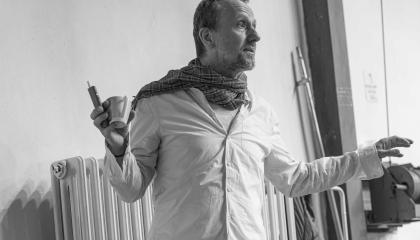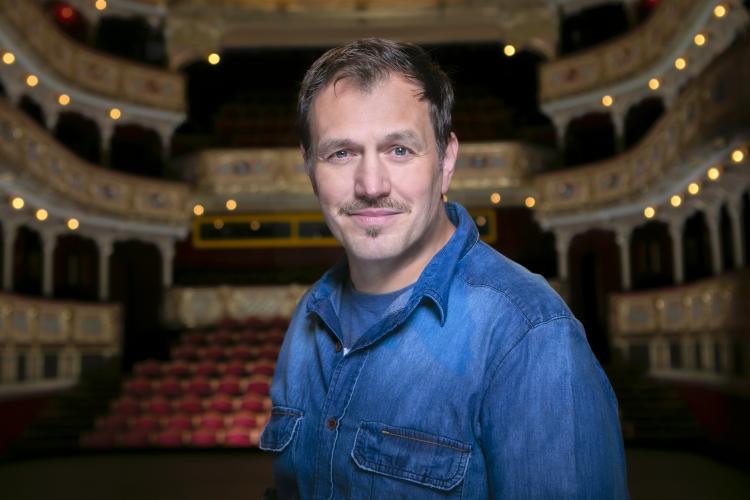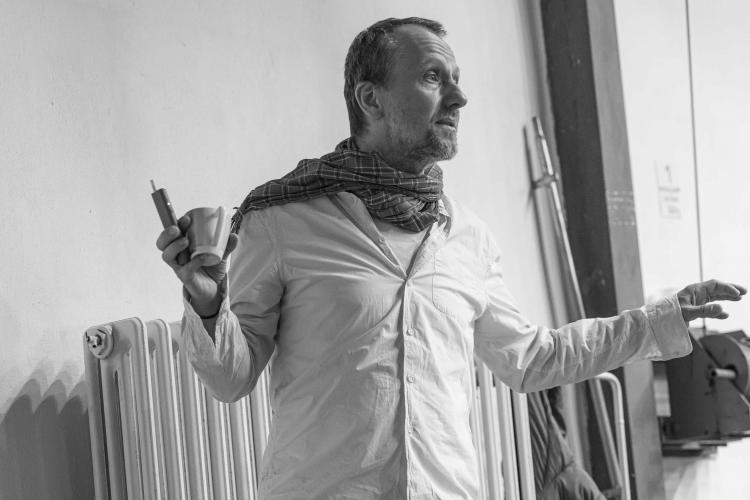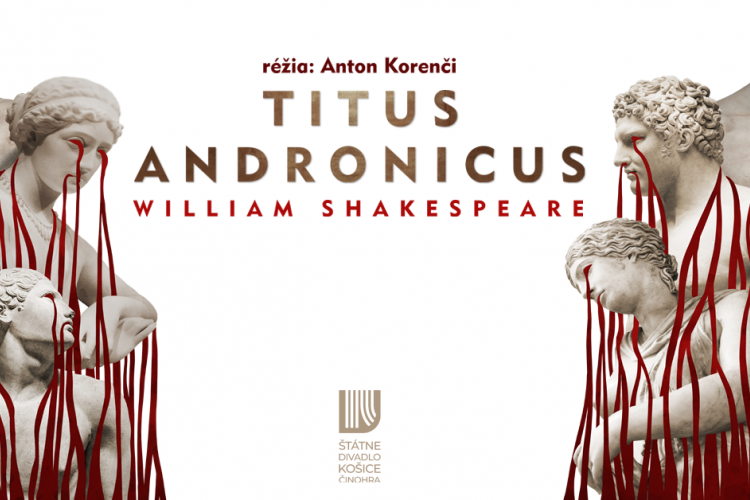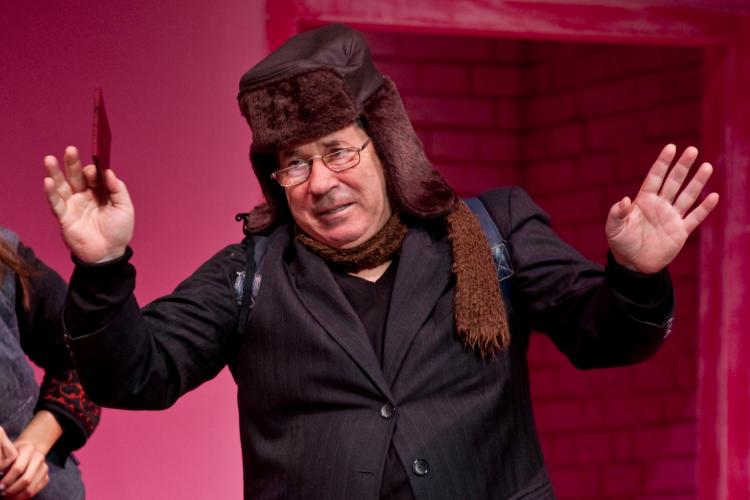The first premiere of the National Theatre Košice in the new year will be the drama production of Bertolt Brecht's "MR. PUNTILA AND HIS MAN MATTI." Before the premiere, scheduled for Friday, February 9th, at the Historical Building of NDKE, Peter Himič, the dramaturge of the Drama Department at NDKE, had a conversation with the director Martin Čičvák.
Our production is not your first encounter with Brecht; in fact, among Slovak directors, you have directed Brecht the most. There must be something behind that...
Engaging intensively with Brecht is natural for me, as I entered the studio of Professor Alois Hajda at the Janáček Academy of Performing Arts in Brno as a student of directing. Professor Hajda directed almost all of Brecht's plays and played a crucial role in the complete translation of Ludvík Kundera, a lifelong friend. Adding to this, the artistic direction of director Petr Scherhaufer, who was also my mentor, and Professor Bořivoj Srba, a devoted Brechtologist who taught us dramaturgy. So, escaping Brecht's aesthetics was impossible, even if one desired it. However, that was not my case. I must say that in Brecht's directorial, and essentially, literary vision, I found myself completely– captivated by the world of tightly guided, rhythmic, artistic theatre. A theatre that places significant emphasis on entertainment and seeks to extract all possible humour from the text. At the same time, it's a philosophical, polemical, passionately thoughtful theatre full of refined paradoxes because that's what Brecht's great, epic, or Total Theatre is.
Can you break it down for me?
Brecht never hesitated to use any expressive means to enhance the narrative value of the story. He always heightened all situations to the edge – uncompromisingly and consistently – and shaped them into a very precise form. The solid structure is evident from the way his plays are written: unrealistic, non-linear structuring, a carefully composed construction made up of large and fully expressive images, interspersed with poetry, addresses to the audience, stage notes, or songs.
And what about other theatre reformers?
A much greater inspiration for me was the Italian director Giorgio Strehler, a scholar of Brecht, whose productions captivated me even as a student. This was because he used all the principles of Brecht's epic theatre but in a much more modern, stylized, and playful manner, and, of course, primarily accessible through various recordings. So, my university educators, Brecht's drama, and Strehler's direction shaped me to read Shakespeare, and even Friedrich Schiller, through Brecht and to read Brecht through Chekhov. To primarily seek the image, figurative name, a consistent and grand stage metaphor that would be a space for sharing (actor's thinking).
Stanislavsky and Brecht, two prominent theatrical figures of the 20th century. Brecht deliberately defined himself in contrast to the great Russian reformer.
Brecht taught us to despise any psycho-realistic approximation and false pretense. Because he always went to the core, to the edge, to the boundary of the possible. With each new production, he pushed the boundaries of theatre and after him, of course, Strehler and other directors in German- and Polish-speaking theatres. So, the idea is to open, push the boundaries of theatre, always seek new, unprecedented possibilities, but at the same time not be cheap, banal, and one-dimensional. Always search for the truth, which exists exclusively and only in paradox, so in the story, the truth that reveals itself in time.
Brecht is also associated with his clear left-wing orientation. How should we perceive his political stances today? And can we separate them from the temporal and human context?
Brecht was a Marxist, but that is not relevant now. Each of us has had or will have long or short Marxist periods. Today, during the horrific aggression of Russia on Ukraine, it is extremely important to be on the right side of history; so personally, I defer any constructive debates with the West indefinitely. Now it is necessary to protect democracy, tolerance, and respect, which are already too vulnerable. Brecht's Marxism has transformed into a profound understanding of humanity, strong social empathy, hidden feminism, and an obsessive defence of the needy.
So what makes the story of Puntila interesting even today?
The play "Mr. Puntila and his Man Matti" is my fifth experience with staging Brecht's plays. The emotional, or rather irrational, reason to reach for it and check its relevance in today's reality was, I must openly admit, mainly the restrictions in the COVID era. I remember that when restrictions were loosening and then returning back in various levels and changes, I thought to myself that it's like dealing with Puntila. After reading it, I realized how lovable this beautiful monster (Mr. Puntila) is, schizophrenically straddling between blinded humanism and just dictatorship. It deals with an unsolvable dilemma within itself. Besides, each of us has a boss, so each of us can intensely empathize – or as Brecht would say, imagine – the problem where our boss exploits us, for example, to attend a four-day party with him, even though we know we won't be at work for those four days, and after sobering up, he will demand the results of our four-day work and ultimately deduct our pay for those four days. Here, we are simply trapped in an unsolvable dilemma, caught in a paradox, like the good-hearted and sacrificial Shen Te in "The Good Person of Szechwan," who, under the force of the argument "How can I be good when everything is so expensive!" decides to disguise herself as her cruel, legally capable cousin to get rid of parasites seemingly dependent on her humanitarian aid. Shen Te, Puntila, and other characters from Brecht's plays (Mother Courage, Gally Gay) are all trapped in unsolvable paradoxes – they share this with the heroes of ancient plays or some of Shakespeare's characters. This makes Brecht one of the greatest playwrights of the 20th century.
But Brecht composes the play about the Puntila's farm as a comedy, specifying it as a folk play.
Yes, Brecht writes comedies. He subtitles his plays as folk plays. Brecht needs the audience to be entertained because "Humour means knowing better!" Only through grotesque (the edge where farce meets tragedy) we can step aside, become aware, understand, look from the outside, and – laugh.

